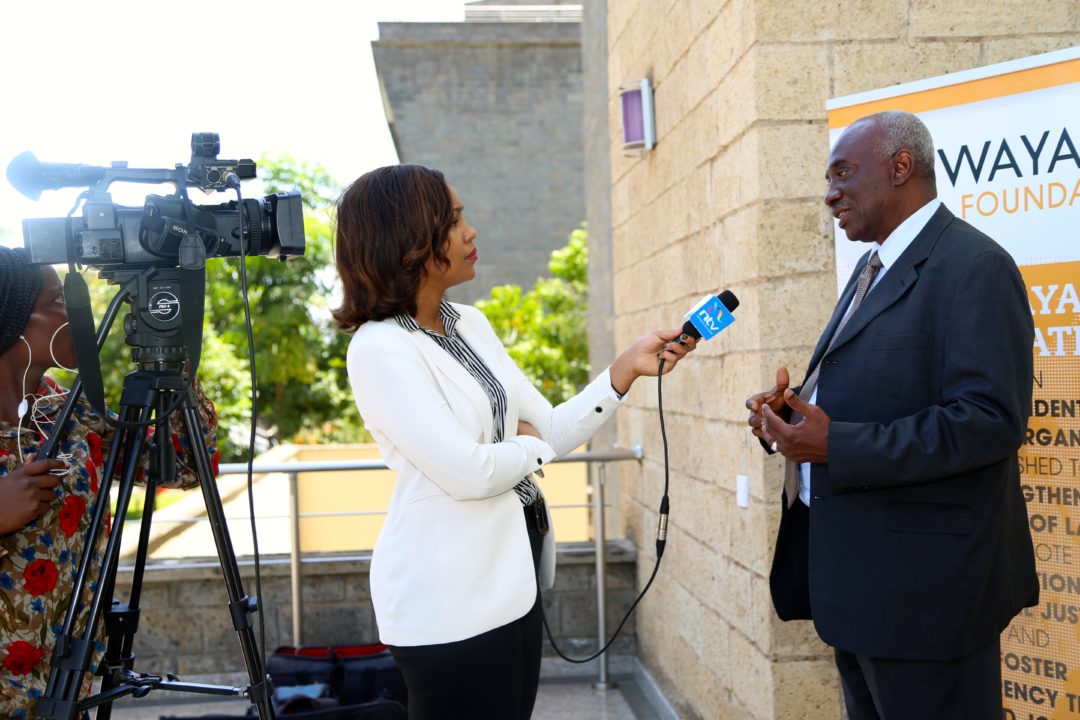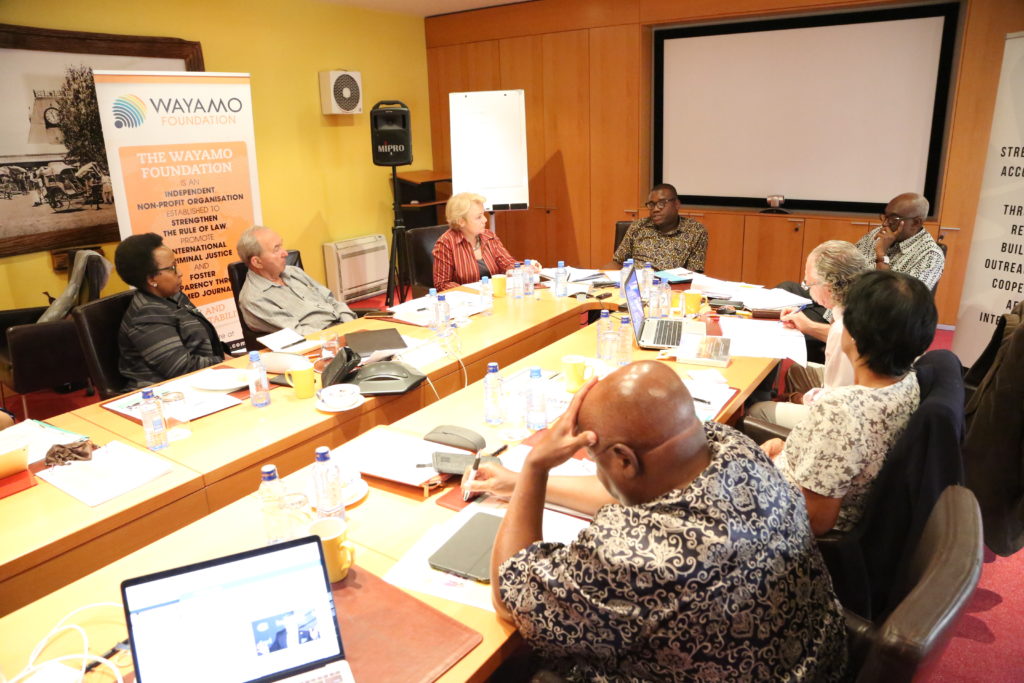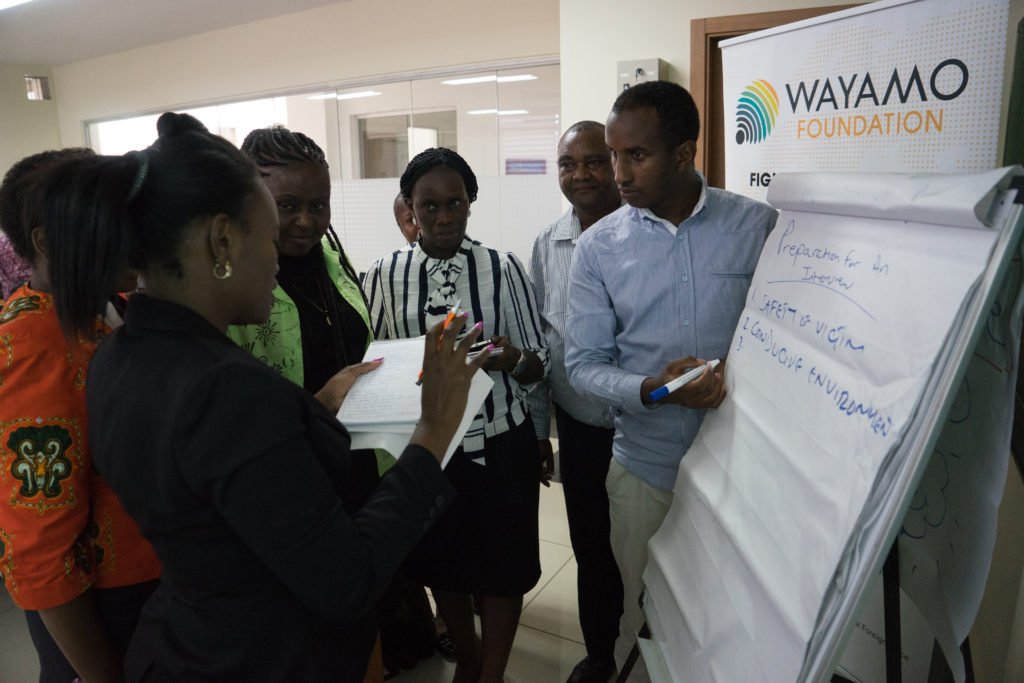Fighting impunity and ensuring accountability in East AfricaRegional capacity building to enable domestic systems to address international and transnational crimes.
The Wayamo Foundation has just concluded a series of five key events -two meetings and three activities- in so many days in Nairobi, Kenya, as part of its “Fighting Impunity in East Africa” project, an initiative funded by the German Foreign Ministry:
- 26 February 2018: Strategic Meeting of the Africa Group for Justice and Accountability (AGJA) – funded by the Ford Foundation
- 27 February 2018: International Justice Symposium: “Networks of Accountability: Justice for International and Transnational Organised Crimes”
- 28 February – 1 March 2018: capacity building workshop for prosecutors and investigators from East Africa on international and transnational organised crimes
- 28 February 2018: media engagement with journalists from East Africa
- 2 March 2018: High-level Network Meeting of Directors of Public Prosecution and Heads of Criminal Investigation Departments
Click here for pictures.
26 FEBRUARY: AFRICA GROUP FOR JUSTICE AND ACCOUNTABILITY MEETING
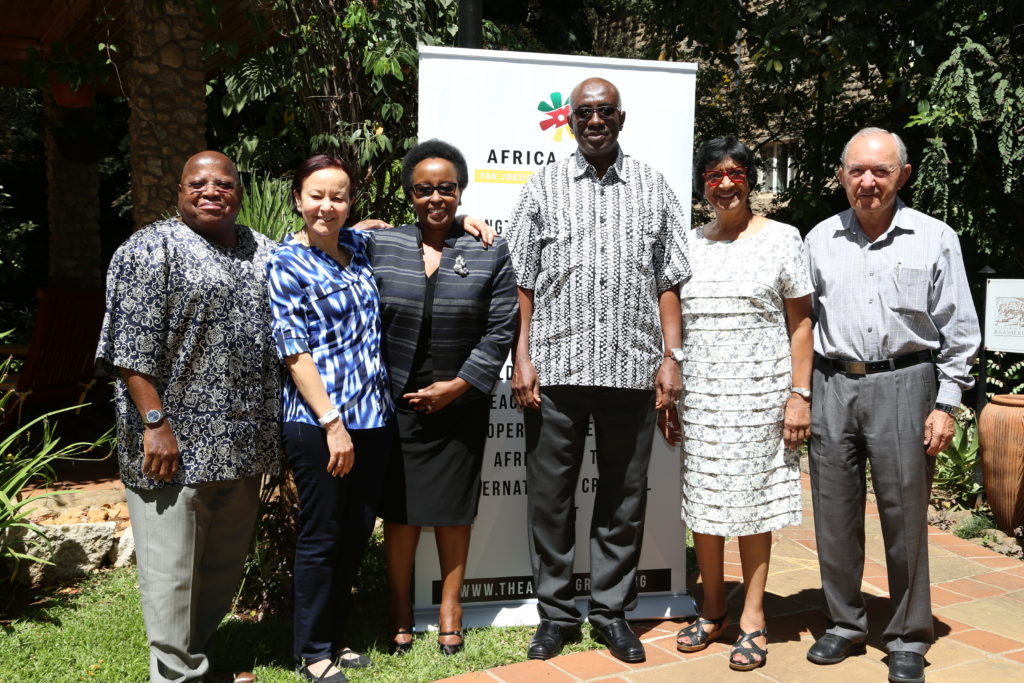
Tiyanjana Maluwa, H. Laddie Montague Chair in Law, Pennsylvania State University School of Law, Fatiha Serour, Director of Serour Associates for Inclusion and Equity, Betty Kaari Murungi, Independent Consultant on Transitional Justice and Human Rights, Hassan Jallow, AGJA Chair and Chief Justice of the Gambia, Navi Pillay, former UN Commissioner for Human Rights and Richard Goldstone, former ICTY and ICTR Chief Prosecutor.
An extremely intensive week began with the Fifth Strategic Meeting of the Africa Group for Justice and Accountability (AGJA), an independent group of thirteen senior African experts on international criminal law and human rights, currently chaired by Gambian Chief Justice Hassan Bubacar Jallow, that came together in November 2015 to strengthen justice and accountability in Africa through domestic and regional capacity building, advice, outreach and diplomacy. This event was funded by the Ford Foundation.
27 FEBRUARY: INTERNATIONAL JUSTICE SYMPOSIUM
NTV Kenya, Feb 27, 2018: https://youtu.be/gNsxgpReoP4
Tuesday’s International Justice Symposium, held under the banner of “Networks of Accountability: Justice for International and Transnational Organised Crimes”, was opened with welcoming remarks by, among others, Luis Franceschi, Dean of Strathmore Law School, George Kinoti, Kenya’s Director of Criminal Investigations, and Githu Muigai, the country’s outgoing Attorney-General.
Click here for the programme.
The moderators and panellists were eminent experts drawn from a wide variety of fields and included: Adewale E. Iyanda, Office of the Legal Counsel, African Union Commission; two representatives from the International Criminal Court (ICC) in the Hague, Philipp Ambach, Chief of the Victims Participation and Reparations Section, and Gloria Atiba Davis, Head of the Gender and Children Unit in the Office of the Prosecutor; Aimée Comrie, Crime Prevention and Criminal Justice Officer at the United Nations Office on Drugs and Crime; FBI Supervisory Special Agent, Jennifer Barnard; Christine Alai from Physicians for Human Rights; AGJA members Betty Kaari Murungi, Professor Tiyanjana Maluwa, and Fatiya Serour; and a judicial trio consisting of former Judges Navi Pillay and Richard Goldstone (both AGJA members), and Judge Isaac Lenaola of the Kenyan Supreme Court and East African Court. The topics were thought-provoking, the comments frank, direct and, at times, hard-hitting, and the impact undeniable, as was plain from the string of reports carried in the social media and national press.
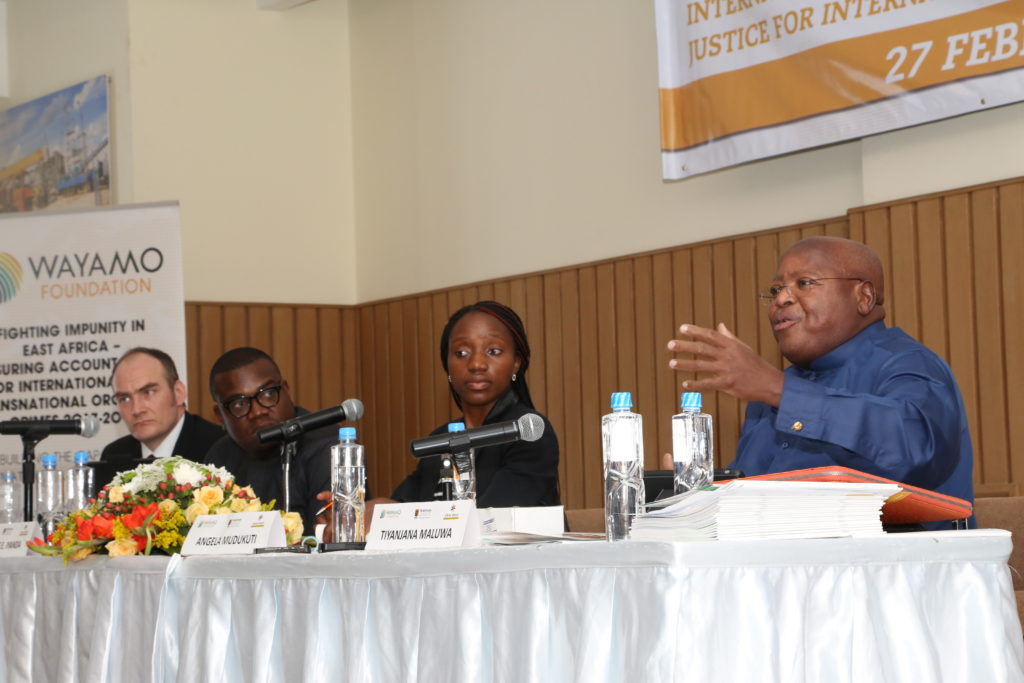
Philipp Ambach, Chief of the Victims Participation and Reparations Section in the Registry of the International Criminal Court, Adewale E. Iyanda, Office of the Legal Counsel, African Union Commission, Angela Mudukuti, International Criminal Justice lawyer, Wayamo Foundation, and Tiyanjana Maluwa, AGJA member and H. Laddie Montague Chair in Law, Pennsylvania State University School of Law.
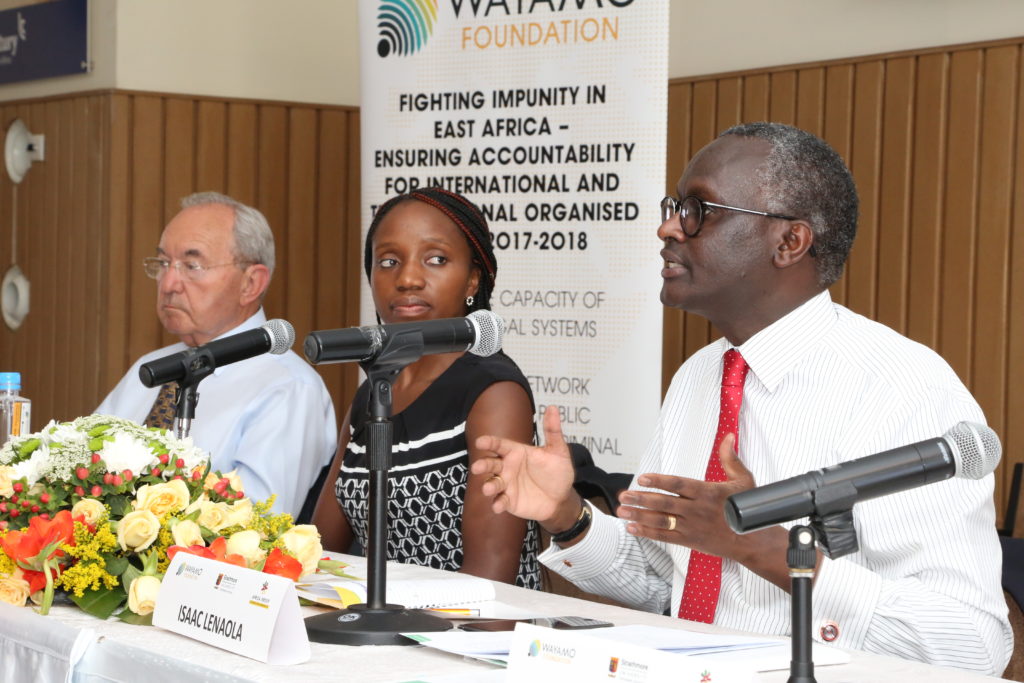
Richard Goldstone, AGJA member and former ICTY and ICTR Chief Prosecutor, Angela Mudukuti, International Criminal Justice lawyer, Wayamo Foundation and Isaac Lenaola, Justice of the Supreme Court of Kenya and Principal Judge at the East African Court of Justice.
TELEVISION
Indeed, such was the media interest in the Group and the Symposium that two AGJA members, former UN Commissioner for Human Rights, Navi Pillay, and former ICTY and ICTR Chief Prosecutor, Richard Goldstone, were immediately invited to join Wayamo Director, Bettina Ambach, as guests in a special, in-depth, live TV interview that very same night:
KTN News, 27 February 2018; Bottomline Africa: Wheels of Justice, https://www.standardmedia.co.ke/ktnnews/video/2000150725/-bottomline-africa-wheels-of-justice.
28 FEBRUARY – 1 MARCH: CAPACITY BUILDING WORKSHOP
The next one and a half days saw a very different kind of activity at the Strathmore University venue, in the form of an intensive training session for investigators and prosecutors from Kenya, Rwanda, Tanzania and Uganda, aimed at building competencies in the investigation and prosecution of international and transnational crimes domestically. This model is purpose-designed to put the complementarity principle into practice, while at the sometime fostering synergies between the international criminal justice community and national legal actors.
The previous day’s panellists now came into their own with presentations that were both academic and practical: on the theoretical side, ICC’s Philipp Ambach spoke authoritatively on “Core international crimes: nature and requirements”, while University of Nairobi Lecturer, Constance V.W. Gikonyo, dissected “The financial trails of transnational organised crime”. Taking a hands-on approach, Gloria Atiba Davis addressed the highly sensitive area of victim/witness interview techniques and evidence collection in crimes involving children, Aimée Comrie concentrated on the complications of handling victims/witnesses in cases of human trafficking, and FBI Special Agent Jennifer Barnard tested the participants’ knowledge and skills with a dynamic interactive exercise on “Financial investigations pertaining to international crimes”.
In thanking the organisers and trainers on behalf of her companions, one of the participants described the presentations as “simply awesome”.
28 FEBRUARY: MEDIA ENGAGEMENT
In parallel with the training workshop, a media engagement was held elsewhere on the campus by Wayamo’s Africa Director, Joseph “Kojo” Roberts-Mensah, and East Africa Co-ordinator, Judie Kaberia, with Deputy Director, Mark Kersten, and International Lawyer, Angela Mudukuti, sitting in on some of the sessions. Journalists from several East African countries were brought together with the idea of helping them hone their reporting and interviewing skills, build knowledge on critical justice-related issues affecting the region, including international and transnational organised crimes, and meet the very real challenges of conflict-sensitive reporting.
2 MARCH: LANDMARK NETWORK MEETING
The week culminated in what can only be called a landmark event.

In addition to the day’s business, the meeting heard two presentations: one given by guest expert, Pierre St. Hilaire, INTERPOL Special Representative to the European Union, entitled “Improving exchange of information and evidence across jurisdictions”; the other given by Rwandan Prosecutor General Jean-Bosco Mutangana on, “International and transnational organised crimes cases: lessons learnt, challenges faced, and way forward to ensure successful prosecution“.
After discussing some final structural, communications and legal issues, and agreeing on the basis for operationalising the proposed Network, the meeting ended with representatives from all the member countries formally signing the “FRAMEWORK ESTABLISHING THE NETWORK OF HEADS OF PUBLIC PROSECUTIONS AND CRIMINAL INVESTIGATIONS IN THE EAST AFRICAN REGION”, the first of its kind in the region.
Within the framework of its “Fighting Impunity in East Africa” project, an initiative funded by the German Foreign Ministry, Wayamo organises judges retreats, workshops for investigators and prosecutors in international criminal justice and transnational organised crime, as well as public outreach activities.

